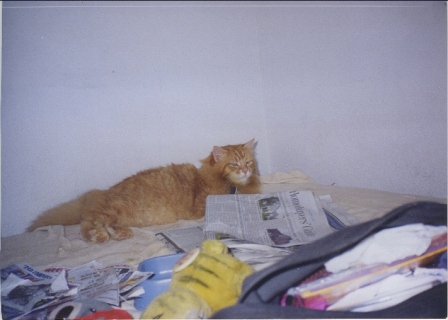 The Essentials of Todja's Daily Regimen
The Essentials of Todja's Daily Regimen
chicken, boiled or grilled on the bone, with some broth and skin;
WD, a high-protein, high-fiber diet for felines with AIDS and digestive problems; occasional fresh salmon or shrimp--poached--for the omega 3's and because Todja loves seafood!
additional fiber (we were using senna but switched to whole flax seeds, and, more recently, to psyllum seed husks, considered to be the ultimate fiber--flax seed, which Todja was taking on occasion, contains an omega 3, alpha lipoic acid, an anti-oxidant being studied in AIDS treatment (described at Aegis; if someone you know has AIDS, he or she may be able to participate in the trial of this nutrient)!);
1 and 1/2 to 2 teaspoons of Barlean's Greens (or Solid Gold seameal, which we got on special when Todja got his lung infection--Solid Gold seameal is excellent; designed for pets but I bet humans would benefit too), dissolved in warm not hot water (a source of vitamin A, the various B vitamins, plant proteins, and fiber)--another option is Top Fin's (delicious) seaweed fish snack (seaweed is an ideal food supplement with the ideal doses of a number of vitamins and minerals for someone who is sick);
500 mg of oyster shell calcium, with vitamin D for absorbtion--to combat wasting (Todja started taking 50 mg daily when he first started getting opportunistic infections and wasting, and when the dose no longer controls his wasting, it's upped--so the dose depends on the stage the virus is at!);
50 mg of magnesium citrate, for calcium absorbtion (we tried 100 mg; it was too much; lately we've dropped magnesium altogether, and Todja seems to do o.k.);
1 and 1/2 mg of melatonin or more, which did seem to help with the diarrhea, in combination with fiber, calcium, and enzyme (actually, when Todja moved from Pennsylvania to Texas and then to Florida, and we were not surrounded by lights all night and smog all day, we gradually reduced the melatonin, and finally went off it completely when Todja had no other infections--with no apparent ill effects!; until then, I was taking the other half of the 3 mg pill to control my lyme disease, and the melatonin plus a little chicken and Barlean's greens did seem to keep my lyme totally controlled [amazingly, after a whirlwind start, the lyme disease gradually grew milder]; two months after getting sick I tried various medicines which helped some but never came close to curing it; I got chest pains so tried coenzyme Q10, chlorophyl, and pennyroyal oil--which, with walking seemed to keep my heart feeling clear of lyme but could not stop the constant skin rashes and even infections and sores on one of my toes that had previously been damaged by frostbite infection and a skin/nerve infection during childhood; the melatonin regimen followed--there's no way to be sure it would have worked without the previous regimens, but it did work and get all the infection out of my toes!);
a small amount of cod liver oil--which like all fish oils is a rich source of vitamins A, D, and the omega 3 fatty acids (these do help the heart some I believe)--and which Todja loves much more than I would--the cod liver oil seems to please him even when he is finicky, and it plus a little witch hazel got rid of some lumps that developed around his chin from too much rubbing with droppers--but we've quit the cod liver supplement for now as it finally irritated Todja's stomach (in the 'good old days' as they're called, cod liver oil was used to treat just about everything; my mom was given only cod liver oil to treat her tb as a child and she got better; whether or not she would have gotten better without the cod liver oil, who knows?);
human digestive enzyme (which includes some calcium carbonate; also some chlorophyl; there's a digestive enzyme for kitties, but it's too expensive);
occasionally, mint and/or ginger--to prevent gas and bloating;
on occasion, a few teaspeans of liquid chlorophyl (this seemed to help reduce the signs of dementia--dilated pupils that did not adjust to light, with some confusion--in Todja, whether these were caused by ill health or the FIV, though did not seem to help McBufderTuf, who ultimately died with paralysis, spasms, and dilated pupils, though he seemed lucid his last day);
pro-biotic for cats (this was in capsules; I believe it's better to get the refrigerated paste; in any case, cats' fauna and flora are a bit different than humans' so it's not advisable to use human probiotics) with cottage cheese; lately just plain cheese has helped; Todja's not really a milk fan as much as he's a meat and potatoes fan.
various things for heart condition aggravated by wasting and diet (potassium gluconate and a bit of powder from hawthorne berry capsules, both good for heart muscles supposedly; exercise and air also seem to help some).
occasionally, a quarter or less of a tablet of baby aspirin (more might give Todja too much sugar and also might upset his stomach) daily--for pain in the rear legs which has developed and also to help him with weight gain--this is done on a hunch I have that anti-inflammatories might reduce the inflammation of his adipose tissue, and thus the adipose's chances of being infected and damaged by HIV!!! (NOTE: adipose is a kind of fat needed by the body. Some fat is good, it's getting the right fat in the right places; it took me years to learn that people needed some body fat to live.) We'll reduce the aspirin though as his legs feel better--as aspirin can slow down the immune system, and this is not always good--and we might go back to L-Glutamine for wasting, a stomach amino acid, not related to aspirin. Ultimately we switched to a meat-flavored joint supplement for cats--from the vet.